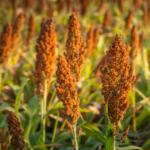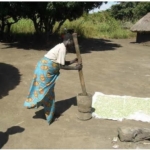


NARO-NaSARRI
Facilitation for Innovation and Sustainable Productivity (FINASP), Kagumu Farmers' Cooperative, P'KWI
Uganda
11/2017—11/2020
Rain-fed agriculture is the main economic activity for smallholder farmers living in the semi-arid regions of eastern and northeastern Uganda. Sorghum is the dominant cereal because of its drought tolerance. Sorghum farmers suffer from low yields caused by soil infertility, pest and disease damage, Striga infestation, and use of unimproved, poor-yielding varieties caused by limited access to quality seeds of improved varieties. The proposed intervention is about acting to sustainably increase sorghum yields, stability, and resilience to deal with extreme hunger, poverty, and malnutrition in the eastern and northeastern regions.
The project team works with farmers on sorghum and legume interventions that can address food and nutritional security challenges faced by smallholder farming communities in lower rainfall regions where the poverty index is extremely high. These farmers’ livelihoods directly depend on harvestable crop yields. Survey data has revealed a large yield gap (>70 percent) between farmers’ current and potential yields. Based on baseline survey results and observations, the team found that yield gaps are caused by a number of factors, including limited access to quality seed, soil infertility, drought, head smuts, insect pests (stem borers), and Striga infestation in monocultures.
The main goal is to [work with farmers on sorghum and legume interventions that can address food and nutritional security challenges faced by smallholder farming communities in lower rainfall regions where the poverty index is extremely high. These farmers’ livelihoods directly depend on harvestable crop yields. Survey data reveal a large yield gap (>70 percent) between farmers’ current and potential yields. Based on baseline survey results and observations, the team found a number of causal factors, including limited access to quality seed, soil infertility, drought, head smuts, insect pests (stem borers), and Striga infestation in monocultures.
The project is well positioned to make an impact on improving sorghum productivity. With support from the McKnight Foundation, new, high-yielding sorghum lines resistant to Striga, drought, and soil acidity were collaboratively developed between Uganda and Kenya. Some lines have already been released as varieties, with sorghum productivity increasing for farmers who managed to obtain the seed. Demand for these new varieties is high. The team proposes to scale up the new sorghum varieties by reaching out to more farmer communities through engagement with farmer groups, NGOs, and farmer research networks. They also plan to train and empower farmers to produce quality declared seed and to engage relevant authorities to register and release the remaining lines.
Outputs:
Outcomes:

